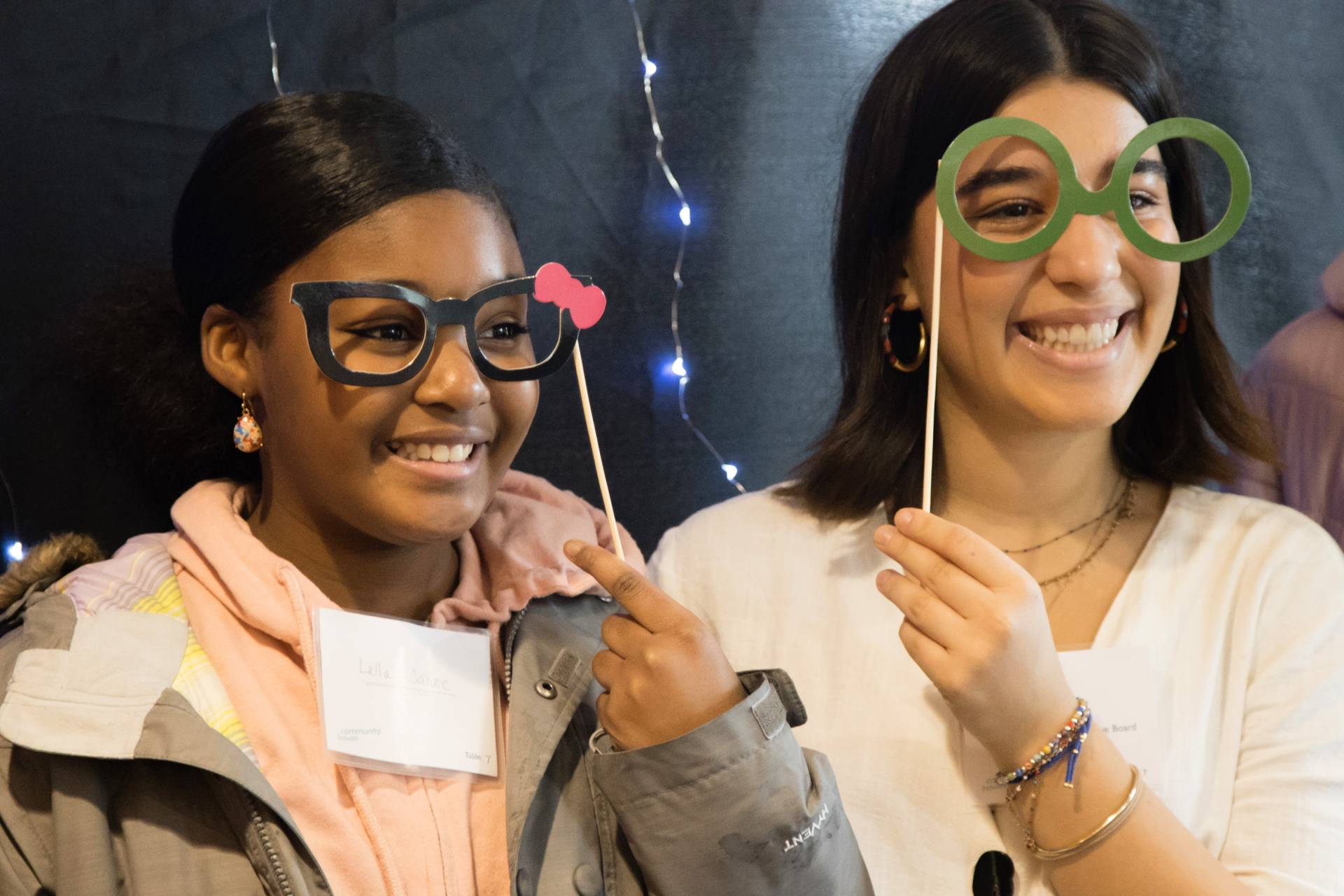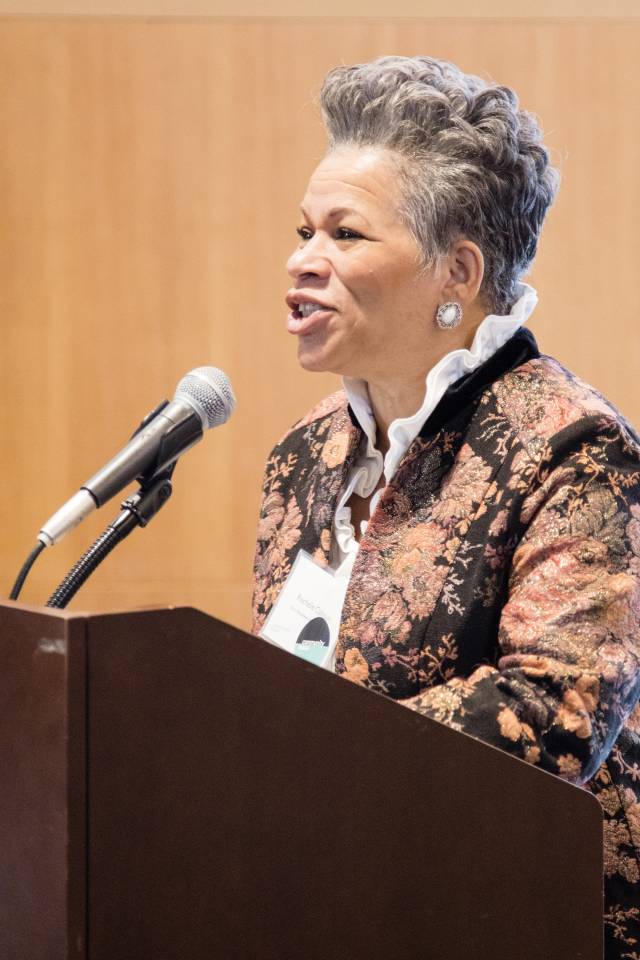Princeton University's Community House is celebrating 50 years of supporting underrepresented youth in the Princeton area. Pictured: Community House founders Michael Gage, Class of 1971, and Gary Hoachlander, Class of 1970, (second and third from left), gather with (from left) Geralyn Williams, Pace Center program coordinator, Jennifer Hoachlander, and Krystal Cohen, Class of 2021 and Community House community and family liaison.
In 1969, seven Princeton University undergraduate students moved off campus to live and connect with the Princeton community. Fifty years later, their outreach and mission lives on as Community House continues to stand with families in the Princeton region, supporting the academic success and social and emotional wellness of underrepresented youth.
“We were here to begin to be in service of the nation,” said Gary Hoachlander, Class of 1970, one of Community House’s founders, at a celebration Dec. 8 with Community House students, families, leaders and alumni at the Carl A. Fields Center for Equality and Cultural Understanding. “Princeton in the nation's service; we took that seriously. When we looked at the world we were living in in 1969, what we were learning on campus, as wonderful as it was, was not enough. If we were really going to deal with the troubles of the ’60s and ’70s, we had to reach out, and move off campus.”
Community House began recognition of its golden anniversary with an inaugural Youth Leadership Summit in November, which invited select high school students who have demonstrated aptitude in leadership to discuss the importance of leadership, how to build leadership skills, as well as how to guide their careers. The program will continue its 50th anniversary celebrations with a “50 posts for 50 years” social media campaign and will host an event at Princeton Reunions in June.
Hoachlander described each of Community House’s founders — Marcus Boggs Jr, Class of 1970; Len Brown, Class of 1971; Michael Gage, Class of 1971; Henry Kennedy, Class of 1970; John Mavros, Class of 1971; and John Vail, Class of 1970 — and how Community House offered a different type of learning, one that was “more diverse, more real, and in many respects more challenging, than the life we had on campus.”
Today, Community House is a program with the John H. Pace, Jr. ’39 Center for Civic Engagement that encompasses 16 student-led projects, serving preschoolers to high school students, as well as a wide range of family-focused events.
The celebration featured speeches from Hoachlander, current and past directors, student volunteers, and community partners, as well as two videos highlighting the impact of Community House on volunteers and youth participants. The luncheon was hosted by Class of 2020 students Jasmine Young and Heather Cho, the co-chairs of the Community House student executive board, and was also attended by several Community House youth participants along with family members.
Earlene Jones, who has had two daughters in Community House, commented on how the strong mentorship and tutoring at Community House has benefited her children. “They’ve been paired with great mentors,” she said. “They love them, they do different activities with them, they talk to them.”

Lalla Sanoe, a Community House After School Academy (CHASA) youth participant, left, is photographed with Princeton student Elif Aydin of the Class of 2022, the Community House finance chair and a tutor-mentor.
This focus on caring and mentorship was also expressed by Charlotte Collins, Pace Center associate director and director of Community House, who in her speech to open the event, praised how “for decades, the love, thoughtfulness, dedication, creativity and care from which this program was born has continued to grow and magnify. And what happens when a steadfast love, unwavering commitment and boundless joy deepen and intensify for 50 years? What happens is magic.”

Vice President for Campus Life W. Rochelle Calhoun congratulates Community House on 50 years of standing with families in the Princeton area.
W. Rochelle Calhoun, vice president for campus life at Princeton, gave a keynote address and spoke about how Community House offers Princeton students a way to put their education into meaningful action. “Community House is a shining example of how Princeton students, over the years, have embodied this idea,” she said. “This idea that their education was purposeful and made meaningful in the service of others.”
Calhoun also emphasized how Community House is central to the University’s mission of prioritizing service. “Because Princeton wants service to be central to the educational experience of all of our students and in the lives of all our alumni, service has become increasingly central to the role of this great university, and Community House plays an important part in helping Princeton realize this aspiration,” she said.
Further remarks were given by Filomeno Cuino, outreach coordinator for Corner House, one of Community House’s community partners; Teeto Ezeonu, Class of 2019, a former member of the Community House executive board; and Marjorie Young, the previous Community House director.
Young spoke about her own experiences with Community House volunteers in high school, and how Community House has kept the commitment to its core mission. “There is nothing greater than education,” she said. “Because you see, once you educate a child, no one can take that knowledge away from them.”
Michael Gage, one of the founders, reflected on how Community House has always been about consequential service and building a community with others. “It's really nice to be back and I appreciate how formative the experience was,” he said. “You were appreciated [for] what you were doing. We were all in the same boat.”
This foundational idea of Community House was reinforced by Collins. “That is truly part of the magic of Community House,” she said. “When you enter in, you are enveloped by a sense of belonging, which in turn allows you to be and bring your full self to the work we do here.”






